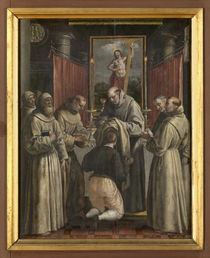The Catholic Defender: Blessed Jutta of Thuringia
- Donald Hartley

- Jun 24
- 3 min read
Updated: Jun 24
Deepertruth with special permission and aid with Franiciscan Media, a great team for the Lord

Today’s patroness of Prussia began her life amidst luxury and power but died the death of a simple servant of the poor.
Widowed noblewoman of Thuringia, Germany, noted for visions and miracles. She married at fifteen and raised children. When her husband died on a pilgrimage to the Holy Land, Jutta moved to Prussia, becoming a recluse at Kulmsee. She is the patroness of Prussia, in eastern Germany.
In truth, virtue and piety were always of prime importance to Jutta and her husband, both of noble rank. The two were set to make a pilgrimage together to the holy places in Jerusalem, but her husband died on the way. The newly widowed Jutta, after taking care to provide for her children, resolved to live in a manner she felt was utterly pleasing to God. She disposed of the costly clothes, jewels, and furniture befitting one of her rank, and became a Secular Franciscan, taking on the simple garment of a religious.
From that point her life was utterly devoted to others: caring for the sick, particularly lepers; tending to the poor, whom she visited in their hovels; helping the crippled and blind with whom she shared her own home. Many of the townspeople of Thuringia laughed at how the once-distinguished lady now spent all her time. But Jutta saw the face of God in the poor and felt honored to render whatever services she could.

About the year 1260, not long before her death, Jutta lived near the non-Christians in eastern Germany. There she built a small hermitage and prayed unceasingly for their conversion. She has been venerated for centuries as the special patron of Prussia.
After Saint Judith of Prussia had provided for her children, who had all been reared in the fear of God, Jutta, with the consent of her confessor, disposed of the costly clothes and jewels she had until then worn in accordance with her rank, as well as all her expensive furniture. She entered the Third Order of St Francis and wore the simple garment of a religious. She devoted herself entirely to the care of the sick, especially the lepers, and to the poor, whom she visited in their hovels and provided with all necessities. The crippled and the blind she led by the hand to her home and took care of their needs.
Many people laughed at the distinguished lady who made herself the servant of the poorest. But she recognized in the poor her Divine Lord, and deemed herself happy and highly honored that she could render them such services. Once when she was at prayer, Christ Himself appeared to her and said to her lovingly:
“All My treasures are yours, and yours are Mine.”

Since very many miracles were wrought at her grave, a special chapel was built in her honor, in which Jutta has been venerated for centuries as the special patron of Prussia.
Jesus once said that a camel can pass through a needle’s eye more easily than a rich person can enter God’s realm. That’s pretty scary news for us. We may not have great fortunes, but we who live in the West enjoy a share of the world’s goods that people in the rest of the world cannot imagine. Much to the amusement of her neighbors, Jutta disposed of her wealth after her husband’s death and devoted her life to caring for those who had no means. Should we follow her example, people will probably laugh at us, too. But God will smile.
Blessed Jutta of Thuringia, give us the strength to leave behind our material goods and follow God for eternal life in Heaven with Him. Amen.





















Comments